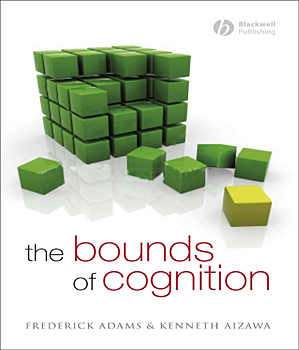“Our view is that, as a matter of contingent fact, minds do not extend,” Adams says.
The book, coauthored by Kenneth Aizawa, Charles T. Beaird Professor of Philosophy at Centenary College of Louisiana, challenges extended cognition theory through critical analysis, pointing out fallacies and shortcomings in the literature. Reviews of the book have said it stimulates discussions that will advance debate about the nature of cognition. Below Adams gave a brief overview of an extremely complex subject.
What is cognition?
Surprisingly, there is currently no agreement on a definition of cognition. Some skeptics have even told us that it cannot be done--a definition cannot be given. We reject that skepticism, but currently, there is wide agreement on the kinds of things that count as cognition: perception, memory, emotion, reasoning, learning and so on. One positive role of this book is to begin a discussion as to what makes a process a cognitive process. In this book, we offer the beginnings of some necessary conditions for a process to be cognitive.
We say that it must involve computations on representations in the real world and the representations must trigger meaning in the brain or nonderived content. The computations are performed on representational states or symbols.
For example, I can think about the University of Delaware. So, something in my mind has the ability to be about and mean this University. I can express my thoughts about this University using language.
Now some cognitive scientists believe that language derives its meaning from thoughts, and so, it is because we are able to think about things--trees, water, birds--that we invent words--"tree," "water," "bird”--to stand for the things we think about. Then the words derive their meaning from the meaning already there in our thoughts and concepts. If so, then language derives its meaning from thoughts. But, from where do the thoughts derive their meaning?
Our view in the book is that there must be some original meaning that is not derived from other things, and cognitive states involve computations from symbols in the mind that have this nonderived meaning. Calling it nonderived does not say that there is no explanation of how the meaning or content arises. There will be a causal story about how it arises. In essence, a cognitive state is a computational state that operates on symbols with nonderived semantic content. Cognitive states are more than that, but they are at least that, and we use this fact in the book.
What is the extended mind?
The thesis of the extended mind says that cognitive processes can literally go (extend) beyond the confines of the head or skull. Our view in the book is that, as a matter of contingent fact, minds do not extend. They could in principle, they just don't. For example, when I use pencil and paper to do a complex math problem, our view is that the thinking takes place in the head. The marks on the paper are just to aid thinking, but they don't constitute thinking. The thesis of "extended mind" is that to characterize thinking (cognition) when doing the math problem we should think of the person plus the pencil and paper as constituting one system. Thinking involved in solving the math problem literally takes place in a total system of brain, arm, pencil and paper. That whole system does the calculating.

Now, why do scientists think this? Why do they think thought or cognition literally extends out into these items? It is because of something known as the “parity principle,” which is a process that takes place in a system consisting of a person, his body and tools in the environment and is used to solve cognitive tasks, such as math problems. If the processes used were to take place solely inside the head--for instance, if we could use visual imagery to do the long division and keep the calculations in memory in our heads instead of using pencil and paper--then the calculation would clearly be a cognitive one. When you use pencil and paper, the calculation does not take place solely in the head. The process using pencil and paper provides the same functional problem-solving task and, as such, becomes part of the thought process. If true, the whole process extends, thus cognition extends. I'm leaving out much, but that is the basic premise for the view that the mind extends beyond the boundaries of the body or brain.
Our book surveys all the best arguments and examples from the cognitive sciences where such claims are made. We analyze the reasoning based upon these examples. We find several flaws in the reasoning, and we find many principled reasons to think that the claims overreach the evidence. So, we conclude that cognition in humans currently does not extend. Though, in principle, it could and might in the future. The positive part of our book is that we do offer the beginnings of a theory of what makes a process a cognitive process. This will be of interest to cognitive science researchers in philosophy, linguistics, psychology, mathematics, computer science, anthropology and biology. But the book leaves much more to be done and points to future directions for research.
Doesn't cognition happen as a result of interaction with the things around us? For example, you see a chair and either someone tells you it's a chair or you make up a word for chair in order to communicate what you saw.
Yes, of course. Things in the environment cause us to perceive them. That is what we call a "causal relation" in the book. But not all causal
relations are constitutive. For example, my digestive system has to be
working and providing nourishment to my perceptual system in order for me to be able to perceive a chair visually. The digestive system provides causal support for vision. But the digestive system is not part of vision. It is not what constitutes vision.
In the book, we show those who believe that cognition extends outside the body are making a “causal/constitution” error. They confuse or mistake the fact that external objects or tools--notes, road signs, calculators--are cognition rather than support cognition.
Would the human brain or mind have been capable of modern scientific and technological advances without the use of computers, calculators, telescopes, etc.? If not, then wouldn't that be an indication of the extended mind?
No. We could not have made the technological advances we have without a digestive system either, but that does not mean digestion is part of the mind or that digestion is cognition. It is a fallacy of logic to say X is necessary for cognition, therefore X is cognition or a part of the cognitive process.
Article by Barbara Garrison


